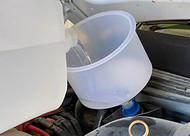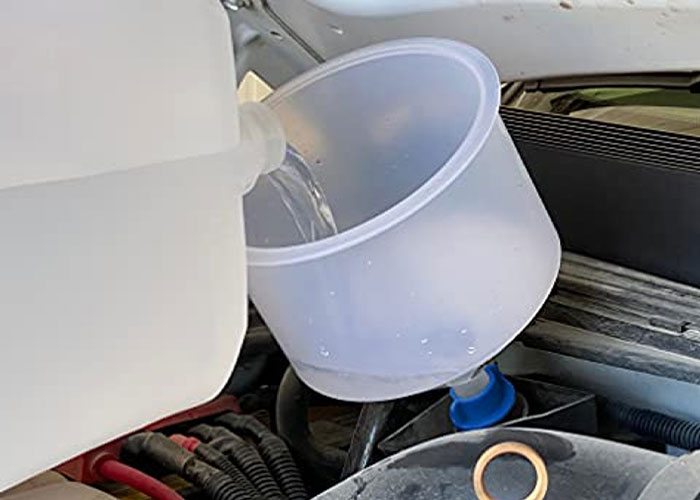What Is The Diesel Exhaust Fluid?
3rd Jun 2024
Diesel Exhaust Fluid (DEF) is a key component in the diesel engine fluid system of modern diesel vehicles, essential for reducing harmful emissions.
In this blog, we will detail every aspect of diesel engine fluid (DEF), from its role in the diesel exhaust fluid system to its storage requirements in the diesel engine fluid (DEF) tank. We’ll explain how DEF interacts within the Selective Catalytic Reduction (SCR) system to comply with environmental regulations and the importance of proper handling and maintenance.
Let’s get started!
What Is The Diesel Exhaust Fluid?
Diesel Exhaust Fluid (DEF) is a solution critical to reducing emissions in diesel engines, consisting primarily of deionized water and urea. It consists primarily of deionized water and urea, which help convert harmful nitrogen oxides into harmless nitrogen and water vapor.
This fluid is stored in a dedicated diesel engine fluid tank and is key to the functioning of the Selective Catalytic Reduction system. By using Diesel Exhaust Fluid, diesel vehicles meet stringent environmental regulations and contribute to cleaner air.
Who Needs Diesel Exhaust Fluid?
Diesel Exhaust Fluid is crucial for the proper functioning of the diesel exhaust fluid system in various diesel-powered machines. Here’s a list of key users who rely on Diesel Exhaust Fluid (DEF) to ensure their diesel-powered vehicles and equipment comply with emission regulations:
- Operators of Modern Diesel-Powered Vehicles - This includes drivers of trucks, buses, and some cars equipped with Selective Catalytic Reduction systems that require compliance with emission standards.
- Fleet Managers - Fleet managers oversee fleets of diesel vehicles in industries such as logistics and public transportation, ensuring compliance with diesel emission standards.
- Construction Equipment Owners - Owners of diesel-powered construction machinery that must meet environmental regulations.
- Agricultural Sector Operators - Farmers and agricultural professionals using diesel tractors and equipment.
- Commercial Vehicle Owners - Operators of commercial diesel vehicles like delivery vans and heavy-duty trucks.
The Components of the Diesel Exhaust Fluid System
The Diesel Exhaust Fluid (DEF) system is essential for reducing harmful emissions in modern diesel engines. It includes key components such as the DEF tank, injectors, and SCR catalyst, each crucial for the system’s effective operation.
DEF Tank
The DEF tank stores Diesel Exhaust Fluid (DEF) and is designed to maintain the purity and proper temperature of the diesel exhaust fluid, ensuring its effectiveness. It is equipped with a level sensor to monitor fluid levels and requires routine checks to ensure the DEF remains uncontaminated and effective.
Injectors
Injectors are responsible for dispensing DEF into the exhaust stream, where it is atomized before reaching the SCR catalyst. DEF injectors are vital for the precise mixing of Diesel Exhaust Fluid with exhaust gases and need regular maintenance to prevent clogging and ensure efficiency.
SCR Catalyst
The SCR catalyst is where the reduction of nitrogen oxides occurs, transforming them into harmless nitrogen and water vapor. The SCR catalyst, made from durable ceramic materials coated with specific catalysts, requires periodic inspections to avoid performance degradation due to clogging or contamination.
Maintenance and Operational Aspects
Maintaining the DEF system involves routine inspections and refilling of the DEF tank, along with regular cleaning of the DEF injectors and monitoring the SCR catalyst. Adhering to manufacturer guidelines for DEF use and storage is crucial for system longevity and emission compliance.
What Does Diesel Exhaust Fluid Do?
Diesel Exhaust Fluid (DEF) is a solution consisting mainly of deionized water and urea, designed to minimize harmful emissions from diesel engines. It plays a critical role in the diesel exhaust fluid system, particularly within vehicles equipped with Selective Catalytic Reduction (SCR) technology.
The fluid is injected into the diesel engine's exhaust stream, where it undergoes a transformation due to the exhaust heat. This process breaks down the urea in Diesel Exhaust Fluid into ammonia and carbon dioxide just before the exhaust gases meet the SCR catalyst.
As the exhaust gases mixed with ammonia pass through the SCR system, a chemical reaction occurs. This reaction effectively converts nitrogen oxides, which are significant pollutants, into harmless nitrogen and water vapor.
By reducing the emission of nitrogen oxides, Diesel Exhaust Fluid not only aids in meeting global environmental standards but also enhances engine efficiency and longevity. This makes DEF essential for maintaining air quality and improving vehicle performance.
How Does Diesel Exhaust Fluid Work?
Diesel Exhaust Fluid (DEF) works by chemically reducing nitrogen oxide emissions in diesel engines equipped with Selective Catalytic Reduction (SCR) technology. Here's how it functions, broken down into succinct paragraphs:
When DEF is introduced into the exhaust stream of a diesel engine, it starts by converting into ammonia and carbon dioxide. This transformation occurs because the urea in DEF decomposes under the high temperatures of the exhaust gasses.
The resulting ammonia from the Diesel Exhaust Fluid is the active component that interacts with the nitrogen oxides present in the exhaust gases. As the exhaust gasses mixed with ammonia pass through the SCR catalyst, a chemical reaction takes place.
During this reaction, the ammonia combines with the nitrogen oxides and, facilitated by the catalyst, converts them into nitrogen and water vapor. Both of these are harmless to the environment and are released into the atmosphere, significantly reducing the vehicle's emissions.
This process allows diesel engines to meet stringent environmental regulations by lowering the levels of harmful emissions they produce, making DEF essential for modern diesel engine operation.
Benefits of Using Diesel Exhaust Fluid
Diesel Exhaust Fluid (DEF) offers significant benefits, particularly in environmental and economic aspects. These advantages ensure that diesel engines comply with legal emission standards and operate more efficiently and responsibly.
Environmental Benefits
Using Diesel Exhaust Fluid (DEF) directly contributes to a substantial reduction in nitrogen oxides (NOx), potent pollutants that contribute to smog and acid rain, thus improving air quality. By converting these NOx into harmless nitrogen and water vapor, DEF improves overall air quality and supports efforts toward environmental sustainability.
Economic Benefits
Incorporating DEF into diesel engines can lead to improvements in fuel efficiency, as the fluid allows the engine to run more efficiently and reduce fuel consumption. Additionally, using Diesel Exhaust Fluid helps vehicle owners avoid costly fines and penalties associated with non-compliance with stringent environmental regulations, ensuring economic savings and operational continuity.
Find Diesel Exhaust Fluid and Equipment at JB Tools
At JB Tools, we provide high-quality Diesel Exhaust Fluid and essential equipment to ensure your diesel engines meet environmental standards while maintaining peak performance. Our selection caters to all needs, from Diesel Exhaust Fluid (DEF) itself to sophisticated DEF injectors, ensuring your diesel engines meet environmental standards while maintaining peak performance.
Trust JB Tools for your diesel maintenance needs and experience our commitment to quality and customer satisfaction.



